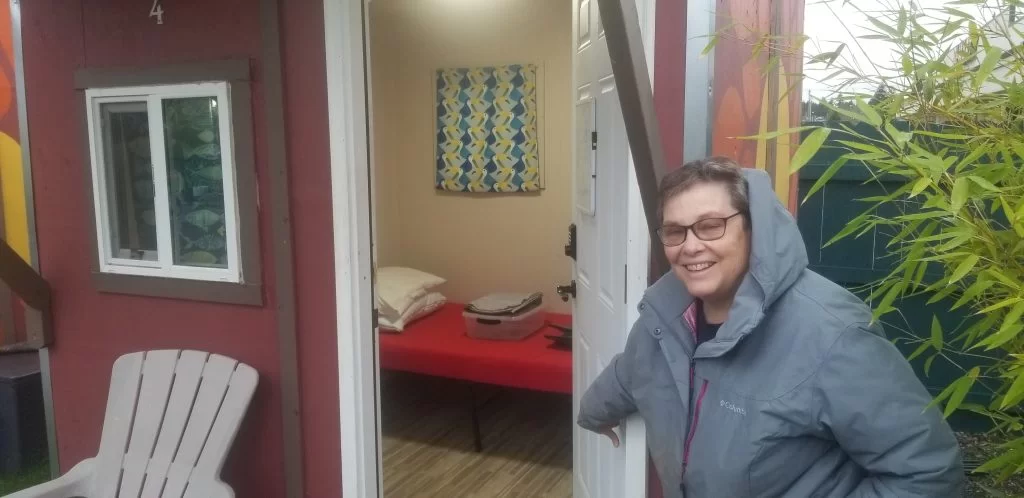https://www.southeastexaminer.com/2023/12/construction-to-begin-on-se-division-st-micro-village/
December 29, 2023
By Marshall Hammond
 A new kind of housing development aimed at serving the most vulnerable members of Portland’s houseless population is scheduled to break ground on city-owned land at SE 19th Ave. and SE Division St. in January. The project, called Avalon, will be a fenced-in “micro-village” consisting of 10 small dwellings and three larger structures housing a shared kitchen, bathrooms and showers.
A new kind of housing development aimed at serving the most vulnerable members of Portland’s houseless population is scheduled to break ground on city-owned land at SE 19th Ave. and SE Division St. in January. The project, called Avalon, will be a fenced-in “micro-village” consisting of 10 small dwellings and three larger structures housing a shared kitchen, bathrooms and showers.
Avalon will provide transitional shelter to people identifying as women, with priorities given to BIPOCs and people with disabilities.
“We’re shovel ready, we have permits from the city, we have all our contractors lined up, we have a construction schedule and we’ve just been unable to start until we had a major infusion of cash to do the build,” says Jan McManus, Executive Director and Co-founder of the Portland non-profit WeShine, which stands for “Welcoming, Empowering, Safe Habitation Initiative with Neighborhood Engagement.” WeShine designs, builds and operates micro-villages to provide free transitional shelter to Portland’s vulnerable populations.
The cash McManus and WeShine were waiting for came from the Joint Offices of Homeless Services (JOHS), who granted the non-profit $1 million to build two micro-villages in 2024—Avalon on SE Division St. and another village at St. Andrews Church on N Hereford Ave.—and enough additional capital to fund the operations of the villages for a year.
McManus, a licensed social worker, co-founded WeShine in 2021 with a group of activists who wanted to take a community-based approach to alleviating the housing crisis.
WeShine’s first JOHS funded micro-village, Parkrose Community Village, was completed in the fall of 2022 on property belonging to the Parkrose Community United Church of Christ. All the village residents identify as LGBTQIA+ and close to half are BIPOCs. “We’re trying to serve people who fall through the cracks or wouldn’t feel welcome or safe in some of the bigger, more traditional style shelters,” says McManus.
McManus and her colleagues at WeShine are proponents of the “housing first” concept—the idea that providing a permanent or long-term residence as a first step creates a safe, stable bedrock that makes it easier to coordinate medical treatment, addiction treatment, job placement and other services.
The city of Portland and Multnomah County currently fund a number of “safe rest villages” that contain between 30 and 60 housing units and are staffed with social workers who provide onsite services to tenants. McManus considers the smaller model of just 10 units that WeShine uses to be a necessary alternative to these larger villages and congregate shelters.
“Micro-villages are needed because there are always going to be people who aren’t going to do well in these large settings,” says McManus. “We can locate (micro-villages) in the heart of an area that’s rich in services and job opportunities. They’re easier to manage and they can fit almost anywhere. All we need is an unused parking lot somewhere and we can make it work.”
Day to day operations of the village are overseen by professional staff who help villagers get access to services and resources, from obtaining proper identification to finding addiction treatment to applying for jobs and housing. The goal is to “graduate” residents of the village into permanent housing and stable living conditions within two years of their move in date.
Cigruna Vidracia moved into Parkrose Community Village in November of 2022. Vidracia had been houseless for months and was on a downward spiral culminating in her checking in to Cedar Hills Mental Health Clinic for suicidal ideation. Staff at Cedar Hills put her in touch with WeShine.
“If I didn’t have a place to go, I knew exactly where I was going, and it wasn’t anywhere positive,” says Vidracia. “It’s not an exaggeration to say that finding this place saved my life.”Vidracia now acts as a spokesperson for the villagers, sometimes conducting discussions and interviews on WeShine’s behalf, and is now hoping to pursue a career as a peer support specialist. She also helped design the colorful floral patterns that adorn the fence of the village.
WeShine met with some resistance after proposing the Parkrose Community Village in 2022. “We’re no different than any other shelters in the sense that when we propose to come into a neighborhood, even if a host has invited us in, there are people who are very frightened and upset because they’ve had some bad experiences with people with issues with substance abuse or mental or health or criminal backgrounds and they’re very afraid,” says McManus.
A nearby retail store posted a petition to stop Parkrose Community Village from being built. “There were petitions on the counters and a thousand people signed saying they didn’t want the villagers,” says McManus. “I think the merchants at that little shopping center now see our villagers mostly as a really positive influence. We’ve helped save lives over there from people overdosing in the parking lot and we’ve put out fires that people have set.”
After a year of operation, none of the problems (mainly increased drug use and crime) that concerned the village’s neighbors materialized. Some of the village’s early opponents have become vocal advocates. So far five villagers have graduated to permanent housing and other residents such as Vidracia appear to be on track to graduate in the next year. With Parkrose Community Village serving as an example, McManus has had an easier time convincing other neighborhoods to host micro-villages.
“We try to get people to come see this village, because once they see it they go, ‘Oh, this isn’t like campers, this isn’t like parked cars, this is something different’,” says McManus.
One group that visited were from New Day School, a Clinton neighborhood alternative preschool that will be one of Avalon’s direct neighbors. “They came over and saw this village, and decided that they weren’t concerned,” says McManus. “They’ve offered to teach yoga to the villagers over there, so I think it will be really cool and I can’t wait for that to happen.”
Learn more about WeShine, including volunteering opportunities, at weshinepdx.org.
WeShine Executive Director Jan McManus showing one of the dwelling units at Parkrose Community Village. Photo by Marshall Hammond.
